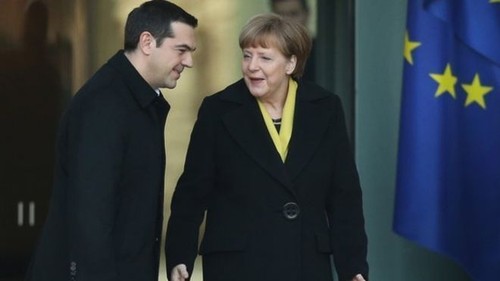(VOVworld) – During the Greek Prime Minister’s first visit to Germany since he took office, Alexis Tsipras and German Chancellor Angela Merkel discussed Greece’s debt crisis and measures to boost bilateral ties. Contrary to diplomatic announcements by the two at a press conference afterwards, the public realizes there are huge obstacles between the two countries and between Greece and the European Union.
 |
| The Greek Prime Minister paid his first official visit to Berlin for talks with the German Chancellor Angela Merkel (photo: bbc.com) |
A day prior to Prime Minister Tsipras’s visit, Greek Foreign Minister Nikos Kotzias was in Berlin to meet with his German counterpart Frank-Walter Steinmeier. After their discussion, Steinmeier said Germany and Greece will not let issues at the EU level affect their good bilateral relations. The two countries will promote their potential for cooperation and reinforce mutual understanding.
Diplomatic announcements
At a joint press conference following their talk on March 23, neither Tsipras nor Merkel mentioned any macro orientation for future cooperation. The German Chancellor talked generally about the importance of their friendly and close relationship and her expectation that German-Greek cooperation will continue, based on mutual trust. The Greek Prime Minister underscored the aim of his visit to enhance understanding between the two governments. He said dialogue is the only way to overcome the current difficulties.
The outcome was no surprise to the public. Merkel had warned Greece not to expect too much from Tsipras’ visit. She said the bilateral meeting could not replace the deal between Greece and Eurozone nations to extend Greece’s bailout by 4 months.
Tensions between Germany and Greece arose after the Syriza Party of Prime Minister Tsipras won the general election and formed a ruling coalition early this year. Prime Minister Tsipras has made several decisions unsettling EU nations. He decided to end the austerity programs designed by Germany in exchange for international aid packages. Then Greece made friendly gestures to Russia as Russia-EU relations grew tense. In his latest speech, Greek Finance Minister Yanis Varoufakis said his country can go bankrupt like Argentina.
Increasing differences
In front of officials of the two countries and international media on March 23, Tsipras said the German-backed bailout of Greece during the past 5 years has not succeeded, and has even had a negative impact on the Greek economy. Greece has lost 25% of its GDP. Youth unemployment has increased to 60%. Public debt has surged, while the economy’s competitiveness has decreased.
Meanwhile Chancellor Merkel said Germany will continue to push Greek reform to stimulate economic growth and bring down the high unemployment rate. She said Athens should restructure to create a stable banking policy and an effective government. Merkel said Germany wants to keep Greece in the Eurozone, but Greece must respect its commitments. She asked Greece to introduce specific reform measures and be ready to resolve its problems in order to receive more bailouts.
German newspapers have revealed some of Greece’s reform measures, which include increasing the tax rate, privatizing public enterprises, rooting out tax evasion, and raising the retirement age. These measures appear not to be enough and Germany and other EU nations want Greece to return to the austerity policy of the previous government. It’s a problem for the new Greek government because they don’t want to break the promises they made to get elected.